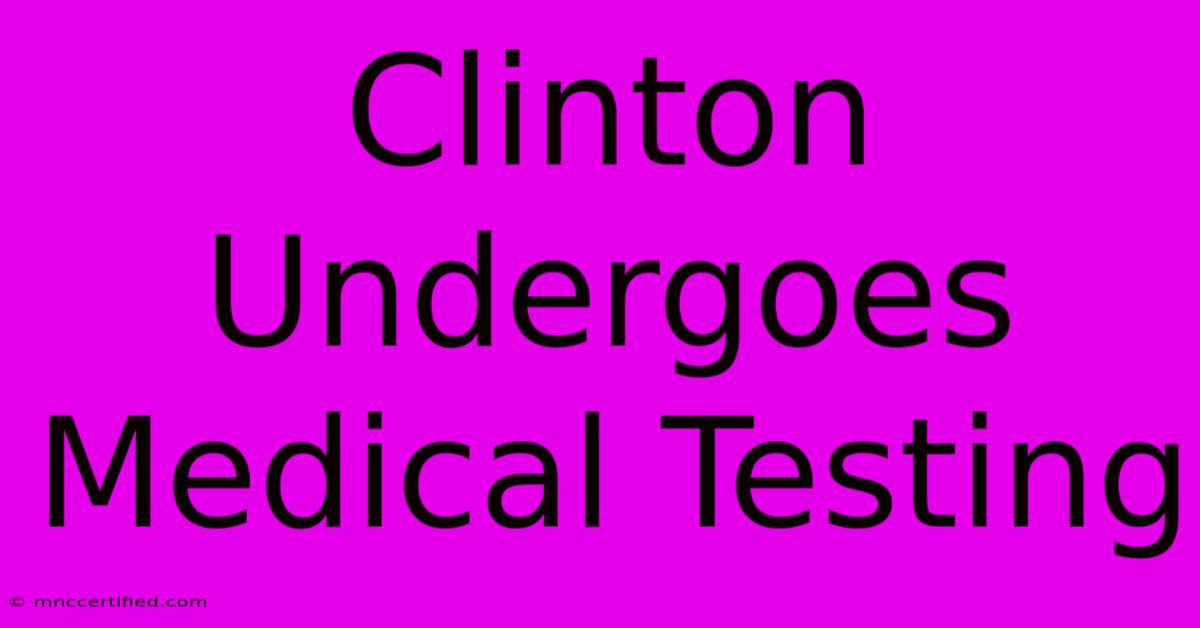Clinton Undergoes Medical Testing

Table of Contents
Clinton Undergoes Medical Testing: A Deeper Look into Health and Transparency
Former President Bill Clinton's health has always been a subject of public interest. Recent news reports indicate that he has undergone medical testing, sparking renewed curiosity and concern. This article delves into the significance of these reports, exploring the importance of transparency in public figures' health, the challenges of balancing privacy with public concern, and the broader implications for political discourse.
Understanding the Context: Why Medical Testing Matters
When a prominent figure like Bill Clinton undergoes medical testing, the public naturally becomes interested. This isn't just idle curiosity; it's a reflection of the significant influence these individuals have, both historically and potentially in the future. Understanding their health status can inform public perception and potentially impact political analysis, particularly if their health could affect any future role in public life. Transparency in such matters fosters public trust and allows for informed discussion.
The Importance of Transparency in Public Health
The principle of transparency regarding the health of public figures is crucial. While maintaining individual privacy is paramount, a degree of openness can help dispel rumors and speculation. Open communication about health concerns, when appropriate, can contribute to a more informed and less sensationalized public conversation. This is especially relevant for individuals who have held, or may yet hold, positions of significant power and influence.
Navigating Privacy Concerns: Balancing Public Interest and Personal Rights
The challenge lies in finding a balance between the public's right to know and the individual's right to privacy. Detailed medical information should remain confidential, respecting patient-doctor privilege. However, a general update on health status, without divulging sensitive details, can often alleviate concerns and prevent misinformation from spreading.
The Media's Role: Responsible Reporting on Health Matters
The media plays a vital role in this delicate balance. Responsible reporting avoids sensationalism and focuses on factual information. Speculation and unsubstantiated claims should be avoided, and sources should be meticulously verified. Ethical journalism prioritizes accuracy and minimizes the potential for causing undue stress or anxiety.
Implications for Political Discourse and Public Perception
The news of Mr. Clinton's medical testing inevitably impacts political discourse. Depending on the nature of the testing and any subsequent announcements, it could influence public perception of his legacy, future potential involvement in politics, or the health of other public figures. It's critical to avoid drawing hasty conclusions and allow for accurate information to guide the conversation.
The Broader Picture: Health and Aging in Public Life
The aging process is a natural part of life, and it’s important to recognize that health concerns are a reality for everyone, regardless of their public profile. The discussion surrounding Mr. Clinton's health should be viewed within the broader context of aging and its impact on public service. It's a reminder that health is a vital aspect of leadership, and open communication about health matters is beneficial for both the individual and the public.
Conclusion: Promoting Informed Discussion and Responsible Reporting
In conclusion, while the specifics of Mr. Clinton’s medical testing remain private, the public's interest and the subsequent media coverage highlight the complex interplay between transparency, privacy, and public health. Responsible reporting, informed discussions, and a respect for individual privacy are crucial in navigating this sensitive area. The focus should remain on fostering a well-informed public discourse, rather than fueling speculation and misinformation. The health of public figures is a matter of legitimate public interest, but this interest must be pursued responsibly and ethically.

Thank you for visiting our website wich cover about Clinton Undergoes Medical Testing. We hope the information provided has been useful to you. Feel free to contact us if you have any questions or need further assistance. See you next time and dont miss to bookmark.
Featured Posts
-
Spurs Turnover Troubles Continue
Dec 24, 2024
-
Anunobys Hot Hand Fuels Knicks Victory
Dec 24, 2024
-
2024s Best Primetime Five Key Moments
Dec 24, 2024
-
Track Santa 2024 Norad Live Feed
Dec 24, 2024
-
Updated 2025 Nfl Draft Top 10
Dec 24, 2024